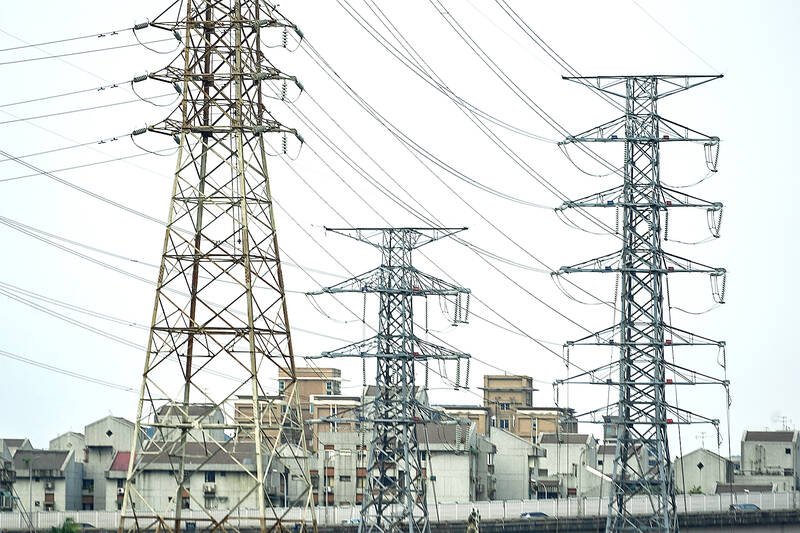Electricity use among the nation’s heavy users last month rebounded 3.35 percent from a year earlier, the fastest growth in 29 months, driven by suppliers of electronics used in artificial intelligence (AI) and other emerging technology applications, the Taiwan Research Institute (台灣綜合研究院) said yesterday.
The latest data indicated that the Electricity Prosperity Index, which the New Taipei City-based research body uses to gauge the health of the industrial and service sectors, stayed “green,” or in a state of steady growth.
The institute is looking at a GDP growth of 4.3 percent for last month, judging by the robust electricity use and export orders.

Photo: CNA
Export orders, which foretell actual shipments by one to three months, last month expanded 10.8 percent from a year earlier, thanks to strong demand for AI chips from US technology giant Nvidia Corp, the Ministry of Economic Affairs said on Monday.
The AI boom would further benefit Taiwan’s export-oriented economy, as local semiconductor firms command global leadership positions in the chipmaking process, the institute said, adding that end-market demand for some non-technology products has also showed signs of normalization.
AI BOOM
Last month’s overall power consumption by the industrial and commercial sectors grew 2.78 percent year-on-year — with a 1.46 percent uptick for the entire manufacturing industry and a 3.35 percent gain among high-voltage users, it found.
Taiwan’s semiconductor firms are by far the largest users of electricity. Makers of PCs and optical devices also reported evident business improvement alongside chipmakers, the institute found.
Local computer brands are keen to take advantage of the AI boom and exhibit AI PCs at the Computex Taipei trade show from June 4 to 7.
Electricity used by makers of machinery equipment and plastic products appeared to have bottomed out, while it floundered for vendors of chemical and rubber products after China terminated favorable trade terms under the Economic Cooperation Framework Agreement, the institute said.
Electricity used by chemical product makers declined 1 percent year-on-year despite a low comparison base last year, it added.
BETTER BUSINESS
Things could improve this quarter, helped by the arrival of the high season and lingering shipping disruptions in the Red Sea that have pushed up selling prices, the institute said.
Power consumed by service providers posted a 9.02 percent spike, as consumer spending held steady, it said.
These positive twists would lend further support to the nation’s economic recovery for the rest of this year, it added.

Nvidia Corp CEO Jensen Huang (黃仁勳) is expected to miss the inauguration of US president-elect Donald Trump on Monday, bucking a trend among high-profile US technology leaders. Huang is visiting East Asia this week, as he typically does around the time of the Lunar New Year, a person familiar with the situation said. He has never previously attended a US presidential inauguration, said the person, who asked not to be identified, because the plans have not been announced. That makes Nvidia an exception among the most valuable technology companies, most of which are sending cofounders or CEOs to the event. That includes

TARIFF TRADE-OFF: Machinery exports to China dropped after Beijing ended its tariff reductions in June, while potential new tariffs fueled ‘front-loaded’ orders to the US The nation’s machinery exports to the US amounted to US$7.19 billion last year, surpassing the US$6.86 billion to China to become the largest export destination for the local machinery industry, the Taiwan Association of Machinery Industry (TAMI, 台灣機械公會) said in a report on Jan. 10. It came as some manufacturers brought forward or “front-loaded” US-bound shipments as required by customers ahead of potential tariffs imposed by the new US administration, the association said. During his campaign, US president-elect Donald Trump threatened tariffs of as high as 60 percent on Chinese goods and 10 percent to 20 percent on imports from other countries.

Taiwanese manufacturers have a chance to play a key role in the humanoid robot supply chain, Tongtai Machine and Tool Co (東台精機) chairman Yen Jui-hsiung (嚴瑞雄) said yesterday. That is because Taiwanese companies are capable of making key parts needed for humanoid robots to move, such as harmonic drives and planetary gearboxes, Yen said. This ability to produce these key elements could help Taiwanese manufacturers “become part of the US supply chain,” he added. Yen made the remarks a day after Nvidia Corp cofounder and chief executive officer Jensen Huang (黃仁勳) said his company and Taiwan Semiconductor Manufacturing Co (TSMC, 台積電) are jointly

MARKET SHIFTS: Exports to the US soared more than 120 percent to almost one quarter, while ASEAN has steadily increased to 18.5 percent on rising tech sales The proportion of Taiwan’s exports directed to China, including Hong Kong, declined by more than 12 percentage points last year compared with its peak in 2020, the Ministry of Finance said on Thursday last week. The decrease reflects the ongoing restructuring of global supply chains, driven by escalating trade tensions between Beijing and Washington. Data compiled by the ministry showed China and Hong Kong accounted for 31.7 percent of Taiwan’s total outbound sales last year, a drop of 12.2 percentage points from a high of 43.9 percent in 2020. In addition to increasing trade conflicts between China and the US, the ministry said